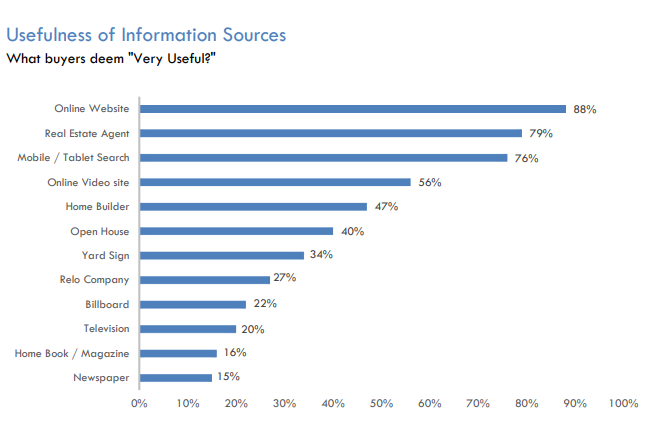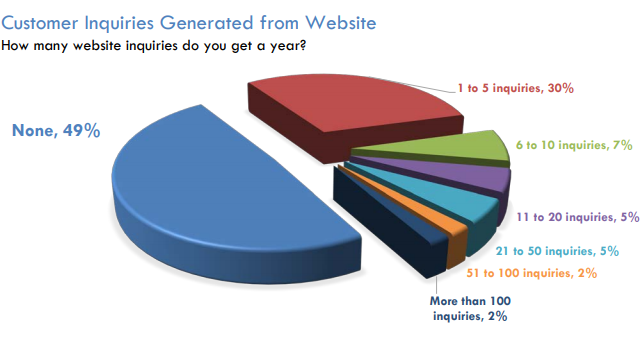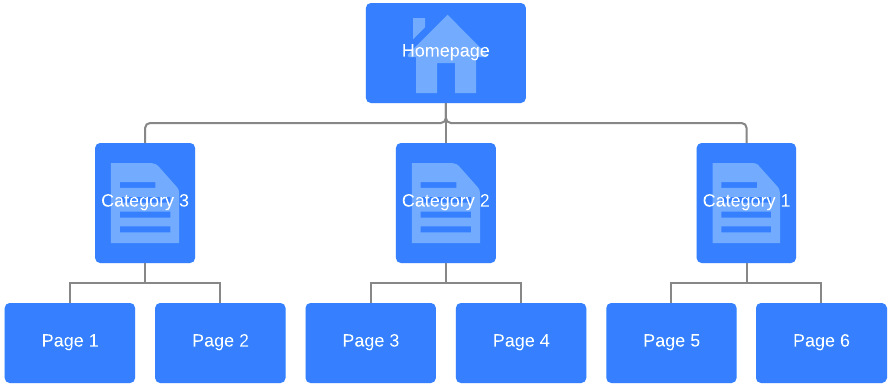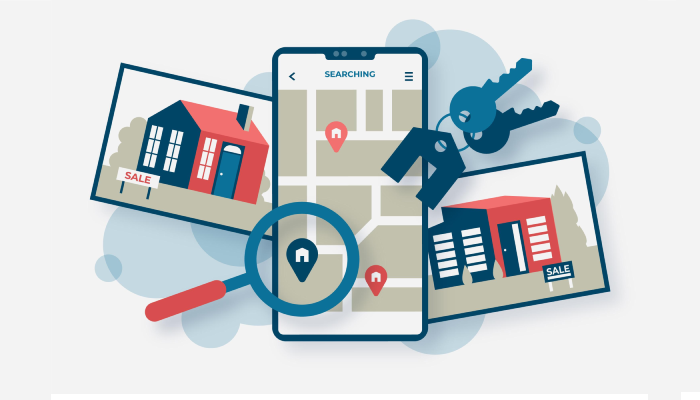SEO for Real Estate Agents: Real Estate SEO Tips You Need to Know
Which source do property buyers find the most useful when it comes to searching for a real estate property? An Online Website! According to the Real Estate Tech Trends shared by Properties Online, Inc., 88% of property buyers find an online website the most useful means to search for properties in any area.

Image Source: Properties Online, Inc.
Want to know another shocking finding? Only 2% of real estate agents get more than 100 inquiries from a website a year.

Image Source: Properties Online, Inc.
What about other realtors? Are they not experienced or knowledgeable enough? No.
The most common reason why most realtors don’t get more leads through their websites is that most of the real estate websites are poorly structured, have poor-quality images, don’t contain relevant and useful content, and most importantly are not showing up in front of potential customers.
What does this mean for any real estate agent? It means now you need to focus on your website’s ranking. Unless your real estate website is visible to people who are searching for properties in your service area, you are not going to gain even a little bit of attention from these potential customers. Meaning, that visibility is the key to success in a real estate business.
How are you supposed to rank your real estate website at the #1 position? How can you increase the visibility of your real estate business online?
Real Estate SEO can be very difficult and overwhelming but not impossible. This post shows you how to rank real estate properties for thousands of keywords, discover the right keywords when to use them, and more here.
So, let’s get started.
How to Rank Real Estate Properties for Thousands of Keywords
Before we guide you about SEO for real estate agents for a myriad of keywords, we would like you to get familiar with what the term ‘keyword’ exactly means and what types of keywords you should be using for real estate SEO.
What are keywords for real estate?
In terms of real estate SEO, a keyword is a word or phrase that describes what people are looking for while searching for real estate properties and related information online. It is the term for which you want to rank your real estate website.
For instance, if you are offering real estate agent services in New York, USA, the keywords you want to target may include:
- Best real estate agent in New York
- NY homes for sale
- NY best realtor
- Buy homes in NY
- Properties for sale in New York
- Condos for sale in NY
- Apartments for rent in NY
- How to buy your dream home in New York and so on
Some real estate SEO keywords have higher search volumes than others. You can easily check the monthly search volume metric for any keyword and discover the right keywords using Google Ads Keyword Planner, or other SEO keyword tools.
Based on the targeted purpose, different types of keywords are marketed to attract different kinds of audiences.
Types of Keywords
In general, there are three main types of keywords that a real estate agent should be aware of:
- Navigational Keywords
- Informational Keywords
- Transactional Keywords
1. Navigational Keywords
Navigational Keywords (AKA Go Keywords) are used to find a specific brand, website, product, service, or location. While using these keywords, the user intent is clear.
How to optimize for real estate queries with navigational keywords
- Include your real estate brand or business name in the title tag and website content
- Create and optimize your Google My Business page with your brand name, company name, website link, and complete address.
- Mention all your service locations on your website as well as the Google My Business page
- Create and optimize social media pages with your brand/company name and services along with locations where you serve.
Besides, you can even create content using these keywords on different topics, such as: Why Trust ABC Real Estate, Properties for sale nearby Disney World, Orlando, etc.
2. Informational Keywords
Informational Keywords (AKA Know Keywords) are used to find general or specific information. In this case, users often have a need or a problem but don’t know how to fulfil or solve it.
Even though it is hard to monetize with these keywords, using them in your content will reward you in many ways.
For instance, Google may use your content for Featured Snippets thus, providing you with the topmost spot on the first page. People will start building trust in your site to solve their issues or fulfilling their needs. Besides, informational topics provide a great way to connect with potential clients.
How to optimize for real estate queries with informational keywords
- Use question-type headings because a user is most likely to ask a question either by typing it or speaking it.
- Create content with tips, how-to guides, and checklists
- Create how-to videos with relevant topics on your service areas
- Create infographics because people love them.
Did you know? Real estate property listings with videos receive 403% more inquiries than those without videos.
While creating content with Informational Keywords, think about what questions your clients mostly have when they meet or call you. Also, you can create posts on what real estate property buyers or sellers don’t know but they must know.
For example:
How to Stage Your Home to Increase the Chances of Selling It?
What it’s like to live in Miami, FL?
Five Tips to Attract Quality Tenants for Your Apartment in Tennessee
3. Transactional Keywords
Transactional Keywords (AKA Do Keywords) are the keywords that people use when they are ready to buy a product or a service. At this stage, users have the intent to complete the transaction. These keywords are the best for monetizing. Even local searches are considered transactional.
How to optimize for real estate queries with transactional keywords
- Create and optimize your service location pages
- Use transactional keywords (along with relevant locations) in sign-up pages and consultation pages
- Include transactional keywords in URLs, title tags, service names, meta descriptions, headings, and content
- Focus on Local Real Estate SEO
Since these keywords have high ROI values, you can also create content for rich snippets or optimize your landing pages by including these keywords appropriately to increase conversions and click-through-rate.
Example:
- Where to buy properties in New York
- Cheap Condos for sale in Houston
- Homes with lakefront in North Carolina
However, the best keywords for any real estate agent are those that help to target a buyer at each stage.
By focusing on the journey of a property buyer as well as the real estate blogging to drive traffic and leads, you can encompass most of the important keywords that can help you bring leads while providing value to your potential clients.
Now, what is a property buyer’s journey? How can you use this journey to do Real Estate SEO?
Though you won’t be serving a property buyer in all stages, you will be helping your potential clients and also doing yourself a favor–forming goodwill, showcasing your expertise, and building authority and trust as a real estate agent – by sharing content on most of the following stages:
1. Checking Finances
Most people start looking for a home when they feel that they can handle it financially. Think about how you can help a person at this stage. There are two ways you can help.
First, you can connect with an insurance, loan, or finance consultant to gather information. After gaining insights, you can create blogs on topics like: When are you truly ready to buy a home? How to know if you are financially ready to buy a home? Tips on Savings to Buy a Dream Home, and so on
Second, you can find a reputable site that provides advice and tips on financing for homes and properties. Now, again you have two options.
Either you can write a generic blog and use their site link for deeper insights. Or, you can create a guest post on a captivating real estate topic and then request that site to publish it as a guest post. If they deem your content to be good enough and think that this content will enhance the value they give to their clients through you, they will be happy to do this.
(You can use the strategy of guest posting in further stages also.)
2. Checklist of a Dream Home
This includes what best features a buyer usually expects in a home. At this stage, a person starts browsing different properties in areas of his/her interest.
This is where you can attract them to your site. What to do?
- Use eye-catching titles, headings, and meta descriptions along with locations to suggest the best properties in your service location.
- Post high-quality images and videos of properties and highlight their best features.
- Besides, you can also suggest to them how you can help them find their dream home.
- Create content on topics like what a dream home looks like what features make a home a dream home, or any creative topic that can lure people to read your content.
Make sure that your website loads within 3 seconds. Otherwise, you will risk losing the majority of aspiring buyers because 53% of mobile site visitors abandon a site if it takes longer than 3 seconds to load.
Tips on How to Increase Page Loading Speed of a Real Estate Website
We understand that it is often difficult while doing SEO for real estate agents to load their websites quickly due to a large number of images and/or videos. So, here is what you can do.
- Optimize and compress images and videos used on your site
- Minimize HTTP requests your site makes for a page to completely render
- Minify and combine your CSS and JavaScript files
- Load CSS and JavaScript files asynchronously
- Defer the loading of large files like JavaScript
- Invest in quality server hosting services
- Enable caching to provide a better experience for returning site visitors
- Prioritize above-the-fold content
3. Research Properties Online
This is the stage when a person begins to look at properties’ images and listings. When an aspiring buyer develops an interest in a property, they tend to click on it to get further details.
At this level, they may not be on your site. They might be looking at local directories. They might be browsing images of beautiful homes on Google Images, Pinterest, or other platforms. So, create accounts on local directories with full details.
To help properties’ images appear in Google search results, you should:
- Use descriptive text for the image using an alt tag or caption to help Google understand what your image is about and what searches it is relevant to.
- Again, we would recommend that you upload high-quality photos.
This takes time. So, have patience. Once your images start appearing in Google search results and people start finding your images interesting, they may want to explore the property further. This may lead them to your site’s page where that property image is uploaded.
Thus, create appealing property pages that provide detailed information, including amenities they can get, public transportation, nearby hospitals, restaurants, schools, and so on. The more info related to property and neighborhood aspiring property buyers can get, the more they will be able to decide on whether a property suits their needs and expectations or not. And the more they are likely to contact you if they find that property worth visiting and buying!
While creating content for property-related web pages, ensure to use local SEO keywords to optimize your website, such as buying the best single-family homes in Encino.
Along with images, also post videos that allow aspiring buyers to have a live tour of properties they are browsing.
4. Site Visits
This is the time when a person clicks on a site to further explore available properties in an area. So, make your website tour easier. How?
Help them find homes or other properties on your site at least area-wise, budget-wise, or nBHK-wise [where n represents the number of bedrooms] by ensuring a seamless and flawless site structure.
Having a well-structured website will increase the chances of an aspiring buyer hanging on your site for a longer time.
What is the best website structure for a real estate business?
In general, the Hierarchical Structure is considered the best for any website. In this website structure, the home page is at the top, your category/navigation pages (types of services or properties you deal in) below the home page, and individual pages (properties page based on locations) at the bottom.

Image Source: Papayasearch.com
Having an easy-to-navigate and attractive website will encourage a site visitor to visit other pages and search for more properties on your site.
5. Shortlist Properties
In this stage, an aspiring buyer finds some properties interesting but still needs more time to decide on which one is best for them.
As mentioned above, make their decision process easy by providing all the necessary and additional information on properties along with images (and videos if possible) that highlight the amazing features or plus points of a property.
6. Negotiation
This is when a potential buyer makes up his/her mind but wants to ensure that he/she gets the best deal.
What can you do for aspiring buyers at the negotiation stage that helps you with real estate SEO?
Provide them tips on how to negotiate while buying a property through blog posting. Explain how you can help them in this stage and make the process stress-free. Sharing content on valuable factors that come into play during successful negotiation is also a good way to attract potential buyers.
By doing so, a buyer might consider working with you to get the best property deals if they are not happy with the negotiation skills of another real estate agent. Plus, if they are already on your site and go through your blog posts, you might be able to impress them with this skill.
7. Documentation
Now, both parties, the buyer and the seller, agree on a deal price and are ready to go ahead with documentation.
Explain what role you will play at this stage on your site. Inform them what documents they need and must receive from the seller, and anything that you think the potential buyers might be interested in.
8. Home Inspection
It is an important step to verify the property based on construction quality, amenities, safety features, and others.
You can share tips on home inspection on your site. Or, you can again choose the path of guest posting on a reputable home inspection site.
9. Property Registration
In this step, a buyer gains legal ownership of the property. You can help your clients understand the process and tell them that you will take care of everything and they can rely on you until the end.
Besides, you can also cover topics on home loans, interior decoration, and packing and moving. Why?
The idea is to act like a one-stop-shop where potential property clients can come to no matter where they are in their property-buying journey.
Even if you are not interested in creating content that doesn’t involve your service, cover almost every topic where you as a real estate agent can help, guide, and serve property buyers and sellers. If a certain stage is out of your service scope, you can share valuable sources where they can find the information they seek.
Covering topics that span a property’s buyer journey will help you target all those keywords that your potential clients might search online. Consequently, you will be able to cover and optimize for thousands of keywords.
Besides, this approach will greatly help you:
- Research and discover the right keywords
- Add the most relevant keywords to your site
- Include necessary location-specific keywords on your site
- Optimize real estate listings with useful content in which property buyers are most interested
- Attract and engage aspiring buyers through compelling content
- Give what aspiring buyers want – high-quality images of properties, property-tour videos, tips, advice, and relevant information
We know all of this can be overwhelming for you while running your real estate business and handling clients. That’s why we are here for you. No matter if you are a real estate agent in London, New York, Metro Manila, Dubai, or any other corner of the world, you can trust us when it comes to Real Estate SEO services. We would not only cover what we have discussed above but also much more to ensure that your real estate business becomes highly visible to online aspiring property buyers and sellers.
Latest posts by Vijaya Tyagi (see all)
What Is YouTube Studio? How To Use It? - April 12, 2024
Advantages and Disadvantages of Social Media For Your Businesses - April 6, 2024

